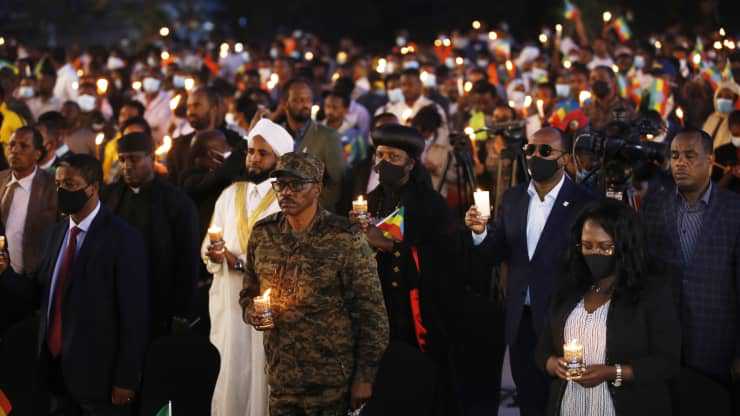Ethiopia braces for all-out war as rebels advance on capital

A year after fighting began in Ethiopia’s northern Tigray region, rebel forces are now advancing on the country’s capital as the authorities urge citizens to mobilize.
The government declared a six-month state of emergency on Tuesday, days after Prime Minister Abiy Ahmed and authorities in Addis Ababa told Ethiopians to take up arms to defend their neighborhoods against the Tigray Defence Forces, an amalgamation of forces from the region’s former ruling Tigray People’s Liberation Front and other rebel groups.
On Friday, nine anti-government groups in the country announced the formation of an alliance called the United Front of Ethiopian Federalist and Confederalist Forces, with a view to overthrowing the government.
The alliance includes the TPLF, which has been embroiled in a conflict with the Ethiopian National Defence Force since November 2020 that has displaced more than 2 million people, according to the U.N., and killed thousands.
The city administration in Addis Ababa last week held a candlelit memorial service for the victims of the Tigray conflict on its one-year anniversary. However, diplomats and regional leaders are now scrambling to bring the warring parties to the table as fears grow over the possible collapse of Africa’s second-most populous nation.
International human rights violations
On Wednesday, the Office of the U.N. Commissioner for Human Rights and the Ethiopian Human Rights Commission released a joint report documenting human rights violations by all parties against civilians in Tigray.
The joint investigation found that “there are reasonable grounds to believe that all parties to the conflict in Tigray have, to varying degrees, committed violations of international human rights, humanitarian and refugee law, some of which may amount to war crimes and crimes against humanity.”
The Ethiopian government has vowed to investigate allegations of human rights abuses, but Laetitia Bader, Horn of Africa director at Human Rights Watch, has called for “robust international scrutiny.”
“Concerned governments should urgently establish and support an independent, international investigative mechanism that can ensure credible scrutiny, preserve evidence for future trials, and facilitate genuine accountability,” she said in a statement Thursday.
“Victims of abuses and affected communities deserve nothing less.”
Reports have also emerged of government forces rounding up Tigrayans in the capital, raising fears of ethnically motivated violence.
The U.S. embassy in Addis Ababa has authorized the departure of non-emergency staff and family members after Washington said it was “gravely concerned” about the expansion and escalation of hostilities, and also urged private U.S. citizens to flee the country.
U.S. envoy Jeffrey Feltman traveled to Ethiopia on Wednesday to meet with state officials, and African Union Commission Chair Moussa Faki Mahamat, State Department spokesman Ned Price confirmed Thursday, reiterating calls for a diplomatic solution. The U.S. has also repeated its threat to impose further sanctions on the country.
“We call on them to enter negotiations without preconditions towards a sustainable ceasefire. We again call for Eritrean forces to withdraw immediately and permanently from Ethiopia, and we again call for all those who are responsible for the human rights abuses and violations to be held accountable,” Price said in a press briefing.
Abiy won the Nobel Peace Prize in 2019 for his role in brokering a landmark peace deal, and Eritrea has now admitted that its forces are aiding Ethiopian troops across the border.
Regular ENDF airstrikes are continuing against Tigray’s regional capital, Mekelle, after a major offensive launched on Oct. 11 failed to stem the advance of the TDF.
Various parties have made conflicting claims about the status of the TDF’s advances, but announcements from Addis Ababa have shown increasing alarm.
Strengthening position for secession
Abiy called on Ethiopians to use “any type of weapons to block the destructive [TDF advance], to overturn it and bury it” and added that “dying for Ethiopia is a duty for all of us.” Facebook removed one of his posts on Thursday for “inciting violence.”
“This kind of language paints a grim picture and suggests that the TDF is capable of striking at both the administrative and geographic heart of Ethiopia,” said Louw Nel, senior political analyst at Oxford Economics Africa.
However, Nel suggested that although an offensive on the capital looks more likely than a few weeks ago, it may not be possible or desirable at this point.
“The TPLF may look to consolidate advances and possibly shift its focus to capturing transportation links between Addis Ababa (Ethiopia is landlocked) and Djibouti,” he said in a note last week.
“This will significantly strengthen its negotiating position with a view on a genuine ceasefire and its greater demands, which may include secession.”